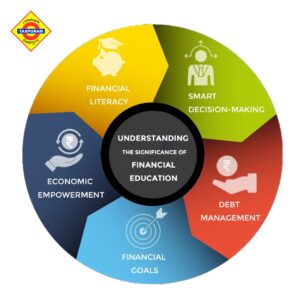
Why is Financial Education important for Young India
Financial education is a topic of growing importance, especially in a rapidly evolving economic landscape like India. In recent years, we have witnessed a significant shift towards a more digital and consumer-driven economy. As India’s young population steps into the world of financial independence and decision-making, the need for financial education becomes more critical than ever before.
Understanding the Significance of Financial Education:
Financial education is not just about numbers, budgets, and investments. It’s a transformative tool that equips young individuals with the knowledge and skills needed to navigate the complex world of finances confidently. The significance of financial education goes beyond managing money; it encompasses:

-
Financial Literacy:
Financial education imparts the ability to read, understand, and interpret financial documents, making individuals more informed consumers and investors.
-
Smart Decision-Making:
Young Indians armed with financial education are better equipped to make sound financial decisions, from choosing the right savings account to making informed investment choices.
-
Debt Management:
It teaches responsible borrowing and the management of debts, helping individuals avoid financial pitfalls that can lead to long-term financial stress.
-
Financial Goals:
Financially educated individuals can set realistic financial goals, whether it’s buying a home, starting a business, or planning for retirement, and take actionable steps to achieve them.
-
Economic Empowerment:
It fosters financial independence and empowers young Indians to take control of their financial futures, reducing dependency on external financial support.
Breaking Down Complex Financial Concepts:
Financial education plays a pivotal role in making seemingly complex financial concepts accessible to young people. Here, we break down some of these crucial concepts into simpler terms:
-
Compound Interest:
This concept explains how your money can grow over time. Think of it as a snowball effect – your initial savings generate interest, and as time goes on, that interest earns more interest.
-
Risk Diversification:
Instead of putting all your eggs in one basket, diversification means spreading your investments across different assets. It’s like not betting everything on a single game but having a diversified portfolio of games to increase your chances of winning.
-
Budgeting:
Imagine your finances as a roadmap. Budgeting helps you plan your journey. You allocate your income to expenses, savings, and goals, ensuring you don’t veer off course.
-
Credit Score:
Think of your credit score as a report card for your financial behavior. Paying bills on time and managing debt responsibly leads to a higher score, which opens doors to better financial opportunities.
-
Investment Risk:
Investing always carries some level of risk. It’s like deciding between a thrilling roller coaster ride (high risk, potentially high returns) and a gentle carousel (low risk, stable returns). Financial education helps you understand the choices and their consequences.
-
Emergency Fund:
Think of an emergency fund as your financial safety net. It’s like having an umbrella on a rainy day. This fund ensures you’re financially prepared for unexpected expenses.
-
Retirement Planning:
Retirement planning is like planting a tree today to enjoy its shade in the future. By saving and investing wisely now, you secure your financial well-being in your retirement years.
Building a Secure Financial Future
One of the most valuable lessons of financial education is instilling financial responsibility from a young age. By introducing financial concepts and practices early, we prepare young Indians to handle money wisely:
-
Savings Habits:
Financial education encourages the habit of saving. Just like a piggy bank fills up one coin at a time, young individuals learn to set aside a portion of their income for future needs.
-
Budgeting Skills:
Understanding income and expenses is crucial. It’s like fitting puzzle pieces together to see the whole picture. Budgeting helps young people allocate money for essentials, savings, and discretionary spending.
-
Delayed Gratification:
Financial education teaches the power of patience and delayed gratification. Instead of spending all their money impulsively, they learn to save for bigger and more rewarding goals.
-
Goal Setting:
Financial responsibility is akin to setting goals and working towards them. Whether it’s saving for a dream vacation or buying a first car, young Indians learn to plan and strive for their aspirations.
-
Debt Avoidance:
They also grasp the importance of avoiding unnecessary debt. It’s like steering clear of a muddy road; it’s easier to stay on track when you’re not bogged down by debt.
-
Critical Thinking:
Financial education fosters critical thinking. Young individuals learn to evaluate financial products, investments, and opportunities, ensuring they make informed choices.
By instilling financial responsibility early, we equip the youth of India with essential life skills that extend far beyond money management. These skills become the building blocks of a financially secure and successful future.
Financial education isn’t just about numbers; it’s about empowering the future. In a rapidly changing economic landscape, where financial decisions are more complex than ever before, imparting financial knowledge to young Indians becomes an imperative.
As a nation, investing in the financial education of our youth is an investment in our collective economic prosperity. It paves the way for a generation that not only dreams big but also possesses the knowledge and skills to turn those dreams into reality.
Recent Posts
- Birla Corp allocates rs.400 crore for cement grinding unit in Prayagraj, Uttar Pradesh
- Karnataka government is looking into a potential partnership with Meta to improve cyber safety.
- Air India and Alaska Airlines Partner to Offer Seamless Passenger Connections to 32 North American Destinations
- India Achieves Record Car Sales in October, Witnessing 16.3% Year-on-Year Growth with 391,472 Units Sold
- YouTube now requires users to either pay for Premium or watch ads, as ad blockers are blocked.






Recent Comments